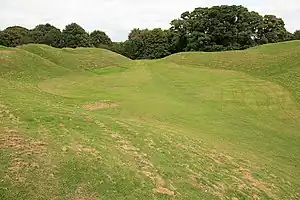Cirencester Amphitheatre
Cirencester Amphitheatre was a Roman amphitheatre in Cirencester, Gloucestershire, England.[1] Its remains are scheduled as an ancient monument.[2]

Archaeological digs have uncovered the earthworks, revealing the outline of the construction, which is still visible, with the banking reaching 25 feet from the bottom of the arena.[1] The arena itself is approximately 150 feet (46 m) by 135 feet (41 m).[3] Roman artefacts including coins and pottery have been discovered on the site.[4] It is estimated that it was constructed towards the beginning of the 2nd century.[1]

In Roman Britain, Cirencester was known as Corinium Dobunnorum, and was the second biggest town in Britannia, after Londinium (London).[1] This amphitheatre is also the second largest, which indicates the significance of the location in Roman times.[1] Although only slightly larger in diameter than the amphitheatre in Silchester, it has much higher sides.[5] The earthworks show evidence of tiered wooden seats for around 8000 people,[6] placed upon terraces made of stone,[1] although a timber-only structure may have existed before the 2nd century.[7] There are two entrances, at the north-east and south-west ends of the stadium.[1]
During the 5th century, when the Western Roman Empire was under attack and soldiers returned to Rome to defend it, the amphitheatre was fortified to defend against the invading Saxons.[1][8] Wooden structures were erected within the arena, placed in postholes, and the north-east entrance was partly blocked.[4][9]
Unlike other amphitheatres, it is aligned in parallel to the streets of the town.[10]
It has also been referred to as the 'Bull Ring', because the sport of bull-baiting used to take place there.[11]
In 2012, plans were announced by the Cirencester Town Council to improve access and signage at the site.[12] Further plans for a visitor centre and car park followed in 2014.[13]
See also
References
- Lord Montagu of Beaulieu (1987), P.H. Reed (ed.), English Heritage, Hampstead Road, London: English Heritage / Macdonald Queen Anne Press, p. 31, ISBN 0-356-12773-7
- Historic England. "Long Barrow and Roman Amphitheatre and cemetery (1003320)". National Heritage List for England. Retrieved 27 August 2016.
- Joan Liversidge (1968), Britain in the Roman Empire, Volume 1968, Part 2, Routledge & K. Paul, p. 377
- C. J. Arnold (1984), Roman Britain to Saxon England: an archaeological study, Routledge, p. 37, ISBN 978-0-7099-0513-4
- Michael Gordon Fulford, The Silchester amphitheatre: excavations of 1979-85, Society for the Promotion of Roman Studies, 1989, ISBN 978-0-907764-12-0
- "Cirencester Amphitheatre History". Histovirus. Retrieved 27 August 2016.
- "Amphitheatre". Corinium Museum. Archived from the original on 28 August 2016. Retrieved 27 August 2016.
- "Cirencester Amphitheatre". English Heritage. Retrieved 27 August 2016.
- Historic England. "Cirencester Roman Amphitheatre (1089343)". Research records (formerly PastScape). Retrieved 27 August 2016.
- Michael Gordon Fulford (1989), The Silchester amphitheatre: excavations of 1979-85, Society for the Promotion of Roman Studies, ISBN 978-0-907764-12-0
- History of Cirencester and the Roman city Corinium, G. H. Harmer, 1886, p. 261
- "Cirencester Roman amphitheatre plans unveiled". BBC. Retrieved 27 August 2016.
- "Venue plan for Cirencester's Roman amphitheatre". BBC. Retrieved 27 August 2016.